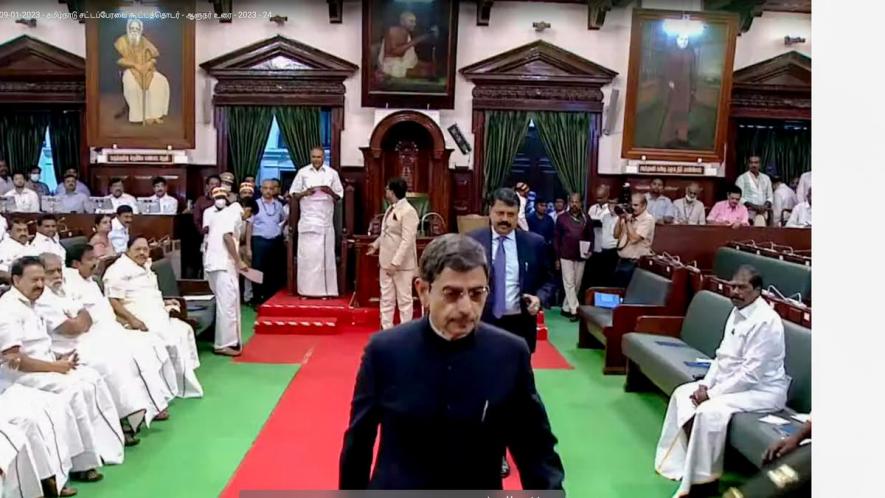Tamil Nadu Governor Reignites Debate on Constitutional Morality

Image credit: The Hindu
Once again, Tamil Nadu Governor RN Ravi faces strident allegations of having acted independently of the aid and advice of the Chief Minister and his Council of Ministers. On Thursday, he dismissed state minister V Senthil Balaji, who holds no portfolio at the moment, but was minister of electricity, prohibition and excise until 14 June. Balaji has been arrested and is in judicial custody as proceedings related to an Enforcement Directorate investigation against him are underway.
Reports late last night said the Governor’s put his decision to dismiss Balaji in abeyance as legal opinion on the matter is sought. Be that as it may, Ravi’s decision to dismiss Senthil on his own—without the aid and advice of the Council of Ministers—is among the rare but startling cases of such spats in the annals of the Indian republic.
Not long ago, Kerala Governor Arif Mohammad Khan was in the news when he wrote to Chief Minister Pinarayi Vijayan that the state finance minister had ceased to “enjoy” the “pleasure” of the governor’s office. The trigger in that case was that the minister allegedly made statements against Khan. In the Tamil Nadu case, what has caused alarm is the governor outrightly dismissing the minister, albeit the dismissal was soon put “on hold”.
Grounds for Dismissal
Ravi’s actions have renewed the debate about the powers of Raj Bhavans across the country. That there have been egregious violations of the letter and spirt of the Constitution is apparent from how the relationship between Raj Bhavans and elected governments has unfolded of late. In the latest episode in Tamil Nadu, clear contraventions of constitutional morality are involved.
First, an official release from Raj Bhavan, Chennai, said on Thursday that Senthil faces serious criminal proceedings related to corruption and money laundering and that he has abused his position as minister by “influencing the investigation” and “obstructing the due process of law and justice”.
The Governor, therefore, had apprehensions that continuing as minister would subvert a fair investigation, which “may eventually lead to breakdown of constitutional machinery in the state”. Accordingly, the Governor declared, he had dismissed Balaji from the Council of Ministers.
To say that if a minister facing investigations retains his portfolio may lead to a breakdown of constitutional order is indeed a fictional—if not preposterous—ground for the minister’s removal. It’s quite possible that India has not seen such a situation since the Constitution came into force on 26 January 1950.
To anticipate a breakdown of the constitutional order when nothing remotely indicates such a possibility would be considered excessive interpretation at the very least—overreach at most. But it is an overreach that seems to be turning into a habit. The DMK government led by MK Stalin ruling Tamil Nadu has a proven majority of elected legislators in the Assembly. The MLAs support the government and it has the people’s mandate to complete a five-year term. Where does the question of breakdown of constitutional order arise?
Recall that the Chief Minister had decided to retain Balaji as minister without portfolio over a week ago—and that, too, had sparked an unnecessary ‘debate’ with the Governor.
Legislative Intent of Constituent Assembly
According to Article 164(1) of the Constitution, the Governor of a State shall appoint the Chief Minister, and other Ministers are to be appointed by the Governor on the advice of the Chief Minister, who “shall hold office during the pleasure of the Governor”.
On 1 June 1949, Dr BR Ambedkar dealt with the objections of several members of the Constituent Assembly to the phrase “shall hold office during the pleasure of the Governor”. During a debate on this Article, [then titled Article 144], various members argued that instead of the doctrine of pleasure, there should be provision that ministers shall hold office while they have the confidence of the majority of the House.
Ambedkar responded: “I have no doubt about...the intention of this Constitution that the Ministry shall hold office during such time as it holds the confidence of the majority.” He said, “It is on that principle that the Constitution will work.”
“The reason why we have not so expressly stated [is] because it has not been stated in that fashion or in those terms in any of the Constitution which lay down a parliamentary system of government.”
So, the legislative intent of the Constituent Assembly is that a minister shall hold office during such time as they enjoy the confidence of the majority of the legislature. This intent—and not any individual’s decision—must inform and guide a governor while discharging constitutional responsibilities.
Put simply, it is not up to governors to decide whether a minister has lost the confidence of the majority of the legislature. That task falls on the shoulders of the State Legislature. Accordingly, since the elected government in Tamil Nadu has the majority support, the Governor has no occasion to withdraw his pleasure from a minister.
In numerous cases, the Supreme Court has ruled that the governor must act on the “aid and advice” of the Council of Ministers. In 1974, in the Shamsher Singh vs State of Punjab case, a seven-judge constitutional bench made it clear that a governor must exercise “formal constitutional powers only upon and in accordance with the aid and advice of their ministers save in a few well-known exceptional situations”.
Earlier Actions of Tamil Nadu Governor
On 15 June, Governor Ravi had refused to act on the recommendation of the Tamil Nadu Chief Minister to reallocate Balaji’s portfolios. It, too, was a rare instance of an incumbent governor disagreeing with an elected government over portfolios.
The actions of Ravi will be seen in their context—of continuous spats between elected governments and appointed governors. It is as if a pattern is being established of governors acting on their own without regard to constitutional morality or the Council of Ministers.
In January, while reading the address to the Assembly as mandated by Article 76 of the Constitution, Ravi went beyond the text prepared by the government—which he had duly approved. He skipped the word “secularism” and terms such as “Dravidian model of governance”, and also omitted illustrious personalities such as Periyar Ramasamy, Ambedkar, K Kamraj and M Karunanidhi.
When Stalin moved a resolution in the House to ensure the written and printed text of the Governor’s address (in English and Tamil) should form part of the proceedings of the Assembly and not anything else he said, the Governor walked out, without waiting even for the national anthem.
Several bills passed by the State Legislature and sent to the Governor for assent are also pending. The Tamil Nadu Governor has neither assented to them nor returned them to the Assembly for reconsideration. It is not that they must be passed—but, as the state government has rightly argued, there cannot be neither, indefinitely. According to a recent report published in The Hindu newspaper, 13 legislations await consent from Raj Bhavan, Chennai, including two sent during the previous AIADMK era.
In April, Ravi claimed that if a governor “withholds” assent to a Bill the Assembly has passed, it meant that the “bill is dead”. It remains unclear what constitutional provisions he was adhering to when making this claim.
Governors in Non-BJP-ruled States
Several governors in non-BJP-ruled states have acted in violation of constitutional propriety in recent years. The Punjab Governor did not convene the Budget Session of the State Assembly earlier this year, though the Cabinet had recommended doing so. Punjab’s Aam Aadmi Party government had to move the Supreme Court to ensure the Session is held.
While hearing the Maharashtra political crisis case recently, the Supreme Court expressed anxiety over the governor’s meddling with issues related to political rivalry. “He [the Governor] cannot exercise a power that is not conferred on him by the Constitution or a law made under it,” the court said.
State governors must uphold the Constitution, and rectify any unconstitutional decisions. This is not to argue that state governments are always correct, and the governor always in the wrong. What matters most is that governors take an oath to preserve, protect and defend the Constitution, and this must continue to mean something. Ravi must not put the governance of Tamil Nadu in constant peril with decisions that appear whimsical. The Constitution is sacrosanct, and governors must decide according to its letter and spirit.
The author served as Officer on Special Duty to President of India KR Narayanan. The views are personal.
Get the latest reports & analysis with people's perspective on Protests, movements & deep analytical videos, discussions of the current affairs in your Telegram app. Subscribe to NewsClick's Telegram channel & get Real-Time updates on stories, as they get published on our website.
























